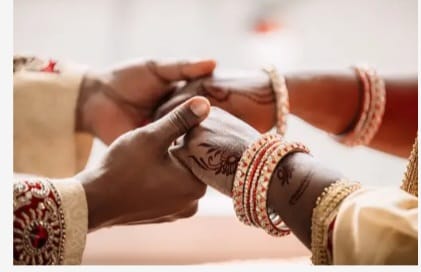A Choice Worth Waiting For
Basit Javeed Qureshi
Nestled amidst breathtaking landscapes and rich cultural traditions, Kashmir has long been a region steeped in age-old customs, especially when it comes to marriage. However, a significant shift in attitudes toward choice marriage has been unfolding in this picturesque region, leading to delays in the timing of marriages. In this opinion article, we will explore the evolving dynamics of marriage in Kashmir, its historical roots, the challenges it faces, and the promising positive outcomes it offers.
Traditional Marriage Landscape in Kashmir
Kashmir has been known for its conservative and closely-knit society, where traditional customs have been at the heart of daily life. Let’s delve into the historical and cultural aspects of arranged marriages in Kashmir.
For centuries, marriages in Kashmir were primarily orchestrated by families, with parents and elders taking on the responsibility of finding suitable partners for their children. These unions were often based on social, economic, and religious factors, highlighting the significance of community and lineage.
The family unit is the cornerstone of Kashmiri society, and elders within the family played a pivotal role in matchmaking. Marriages were seen not just as unions of two individuals but as unions of two families, with compatibility between families deemed as vital as compatibility between the couple.
Kashmiri society traditionally adhered to religious and social norms concerning marriage, deeply influenced by the predominantly Muslim population in the region. Arranged marriages were seen as a means to preserve religious and cultural values.
Shifting Attitudes Towards Choice Marriage
Over the past few decades, there has been a noticeable shift in attitudes toward choice marriage in Kashmir, driven by changing social, economic, and cultural factors.
Several factors have contributed to this change, with exposure to diverse cultures, mainly through the media and the internet, playing a significant role. Young individuals have been exposed to different ways of life and have become more open to the idea of selecting their life partners.
The spread of education, especially among women, has had a transformative impact on attitudes toward marriage. Educated individuals often have aspirations, career goals, and personal preferences that influence their choice of a life partner.
Delay in Marriage and Choice Marriage
The shift toward choice marriage in Kashmir has not occurred in isolation.
The transition to choice marriage often involves a longer courtship period, as individuals take time to get to know their potential partners. In contrast, arranged marriages may have shorter courtships due to familial pressure and expectations, contributing to the delay in marriage ceremonies.
Analyzing statistics and case studies can provide valuable insights into how choice marriage is linked to the delay in marriages in Kashmir. Data may reveal trends such as increasing age at marriage and changes in the age at which individuals enter courtships.
Several factors contribute to the postponement of marriages in the context of choice marriage. Ambitions for education, career, and personal growth often take precedence, prompting individuals to delay marriage until certain milestones are achieved.
Challenges in Embracing Choice Marriage in Kashmir
The transition from arranged marriages to choice marriages in Kashmir has not been without challenges. The resistance and difficulties faced by those opting for choice marriage are significant hurdles.
Families in Kashmir have historically played a central role in the marriage process. When individuals choose their life partners, they might encounter resistance and pressure from their families to conform to traditional norms, resulting in marriage delays.
The societal judgment and stigmatization of those who opt for choice marriage can be a significant deterrent. Those who break away from tradition may face criticism and ostracization, causing some to reconsider their choices.
Balancing modernity and tradition can be a challenging feat in a society that is in the process of transition. Individuals who choose to embrace choice marriage often find themselves at the crossroads of conflicting values, which can slow down the decision-making process.
Positive Outcomes of Choice Marriage
Despite the challenges, choice marriage has its share of positive outcomes.
One of the significant advantages of choice marriage is the potential for greater compatibility and happiness in the long run. When individuals have the freedom to select partners based on personal preferences and shared values, the likelihood of a successful and satisfying marriage is higher.
Studies have shown that choice marriages tend to have lower divorce rates compared to arranged marriages. This indicates that when individuals have the freedom to choose, they are more likely to invest time and effort into making their marriage work.
Choosing a life partner can have a positive impact on an individual’s emotional and psychological well-being. The absence of forced unions can lead to lower stress levels and a greater sense of fulfillment.
Potential Solutions and the Way Forward
Given the ongoing transformation in attitudes towards marriage in Kashmir, let’s explore potential solutions to address the challenges faced by those who opt for choice marriage.
Promoting open dialogue and education can help bridge the gap between tradition and modernity. Creating platforms for discussions and providing information about the advantages of choice marriage can be instrumental in changing societal perspectives.
Kashmir can benefit from providing legal and social support to individuals who opt for choice marriage. This can include mechanisms to protect those who choose their life partners from harassment and discrimination.
Encouraging societal acceptance of choice marriage is vital. Society should be more inclusive and understanding of the changing dynamics of relationships, encouraging individuals to make choices that align with their personal values.
The shift in attitude towards choice marriage in Kashmir has undoubtedly caused delays in traditional marriage ceremonies. This transformation is complex, marked by both challenges and opportunities. As the region continues to evolve, it is essential to find a balance between tradition and modernity, ensuring that individuals have the freedom to choose their life partners. This change may take time, but it is a choice worth waiting for, as it can lead to more compatible and happier unions in the long run.




